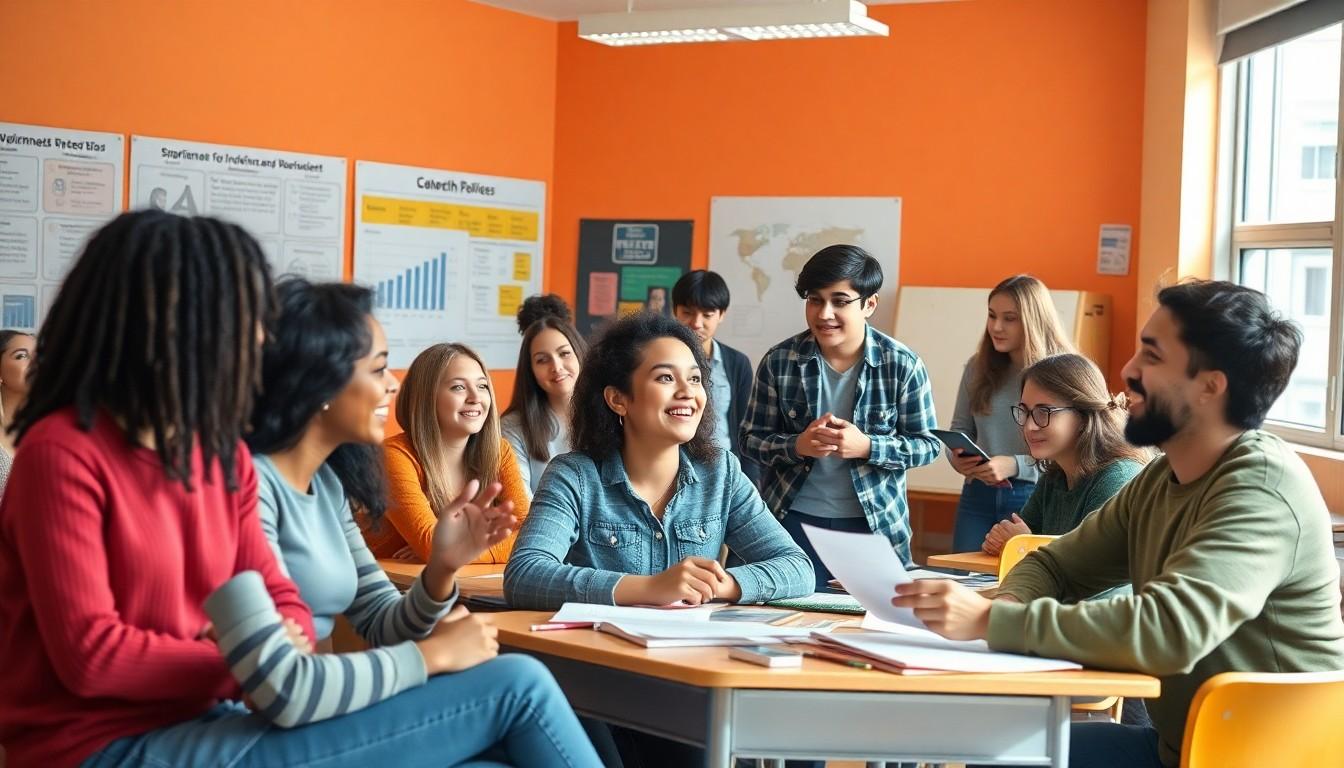Phone:
(701)814-6992
Physical address:
6296 Donnelly Plaza
Ratkeville, Bahamas.

Political socialization isn’t just a fancy term for how people pick their favorite pizza toppings. It’s the process that shapes individuals’ political beliefs and values, influencing how they engage with the world around them. From family dinners filled with heated debates to social media rants, these experiences mold citizens into informed voters—or at least that’s the goal.
In the realm of AP Government, understanding political socialization is like having a secret decoder ring for the political landscape. It reveals how factors like culture, education, and peer influence can steer opinions and voting behavior. So buckle up as we dive into this essential topic, exploring how the forces of socialization impact democracy and why it matters more than ever in today’s fast-paced political arena.
Political socialization defines how individuals acquire their political beliefs and values. Recognizing this process helps in understanding political behavior and voter engagement.
Political socialization shapes a person’s political identity through various experiences. It encompasses interactions with family, education, and media that influence beliefs. This process is crucial for understanding diversity in political perspectives. Engaged citizens can better express their views and participate in democracy. AP Government students gain insights into how these dynamics evolve in response to social change. Grasping the significance of political socialization fosters informed citizenship.
Multiple agents play vital roles in political socialization. Family serves as the primary influence, establishing foundational beliefs. Schools impart civic education, promoting awareness of governmental processes. Peer groups contribute perspectives, impacting individual political orientations. Media, including social media platforms, shapes public opinion through exposure to diverse viewpoints. Religious institutions also affect values and beliefs, influencing political attitudes. Understanding these agents clarifies how they collectively engage individuals in the political system.

Family serves as a primary agent of political socialization, significantly shaping political beliefs and values from an early age.
Parents’ political beliefs influence children’s views directly and indirectly. Children often adopt the political ideologies of their parents, which can manifest in discussions at home. Research shows that if both parents align politically, their children are likely to follow suit. Active engagement in political conversations at home fosters awareness and understanding of political issues. For instance, family discussions during elections can spark interest and promote informed voting behaviors.
Intergenerational transmission of values ensures that political beliefs persist through generations. Patterns of political participation often emerge within families, with children following the voting behaviors of their parents. Strong ties to family heritage and values can reinforce political attitudes over time. Studies indicate that individuals whose parents are politically active are more likely to become engaged citizens themselves. Additionally, storytelling about past political struggles and triumphs can inspire new generations to participate in advocacy and voting, further embedding political values within family traditions.
Education plays a crucial role in shaping political attitudes and values. Schools serve as primary institutions for exposing students to political concepts and civic responsibilities.
Schools facilitate discussions on governmental structures and democratic processes. Students engage in debates that challenge their viewpoints and broaden their understanding. Social studies classes introduce historical contexts, allowing students to see how past events shape current political landscapes. Furthermore, extracurricular activities, such as debate clubs and student government, foster active participation. Participation encourages civic engagement beyond the classroom. Each experience contributes to a comprehensive understanding of political ideologies.
Curriculum significantly impacts students’ political awareness and critical thinking skills. Courses designed to incorporate current events empower students to analyze news stories, recognizing biases and perspectives. Educators emphasize the importance of informed citizenship through projects and group discussions. Such strategies help develop analytical skills necessary for responsible voting. Additionally, exposure to diverse perspectives during lessons cultivates openness to varied political beliefs. The depth of knowledge gained in classrooms forms the foundation of political engagement among young voters.
Media acts as a crucial agent in the political socialization process, shaping beliefs and attitudes about politics. Various formats, including traditional and digital media, play distinct roles in how individuals form their political perspectives.
Traditional media channels, such as television and newspapers, have historically provided significant political information. They establish context and define narratives on current events, significantly influencing public opinion. Conversely, digital media, especially news websites and blogs, streamlines access to information, offering diverse viewpoints at a rapid pace. News consumption habits differ greatly between generations. Young voters increasingly rely on digital platforms for news, creating an environment where information can be shared instantaneously. This shift changes political engagement, as citizens now curate their news feeds based on preferences, impacting beliefs and civic participation.
Social media serves as a powerful tool for political socialization. Platforms like Twitter and Facebook enable users to engage with political content, share opinions, and participate in discussions. Through likes, shares, and comments, individuals amplify their political voices, influencing peers’ perceptions. Viral content often shapes political narratives, swaying opinions rapidly. Additionally, algorithms tailored to user preferences create echo chambers where individuals encounter similar viewpoints. These dynamics can reinforce beliefs, impacting the diversity of political discourse. Consequently, social media not only informs but also engages users, playing a pivotal role in the formation of political identity and values.
Political socialization plays a vital role in shaping individuals’ political identities and values. By understanding the various agents of socialization—family, education, media, and peer groups—citizens can better navigate the complexities of the political landscape. Engaged citizens who recognize these influences are more likely to participate meaningfully in democracy.
As political dynamics evolve, the impact of socialization methods continues to shift, particularly with the rise of digital media. This ongoing transformation highlights the importance of being informed and open to diverse perspectives. Ultimately, a well-rounded understanding of political socialization empowers individuals to express their views confidently and contribute to a more vibrant democratic society.